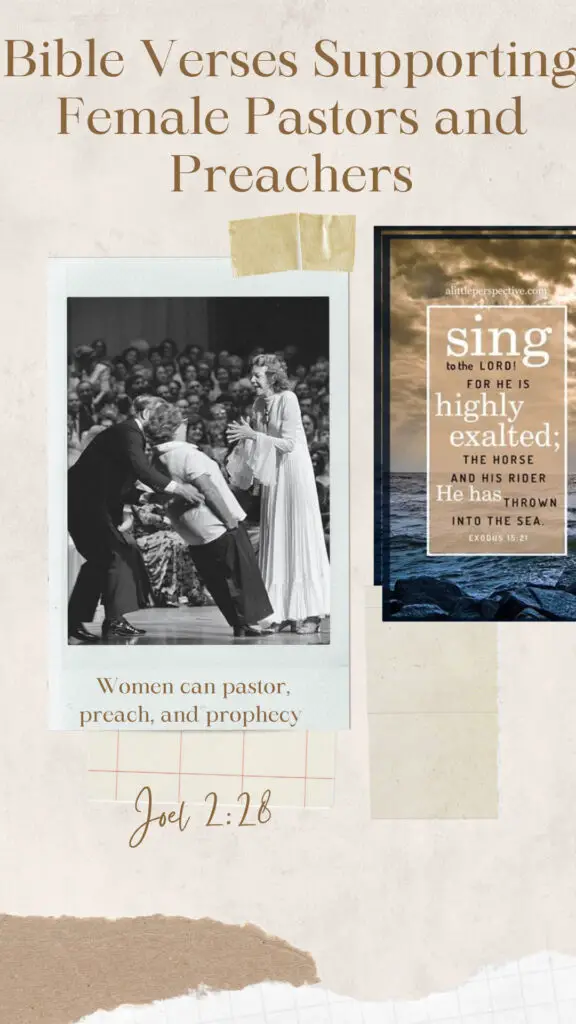Who is right? When it comes to the debate over female pastors and preachers, there are a multitude of opinions and viewpoints.
Some people argue that only men should be allowed to lead churches, while others believe that women can and should be able to take on leadership roles.
But what does the Bible have to say about this topic? As with many religious debates, the answer lies in examining biblical evidence.
For this reason, in this article, we will explore some of the most significant Bible verses supporting female pastors, preachers, and female in leadership and ministry.
Our goal is to present the information in a clear and simple way, so that even a child can understand the arguments presented.
So, let us dive into the scriptures and discover what they say about women in leadership roles in the church.
Bible Verses Supporting Female Pastors and Preachers: kjv
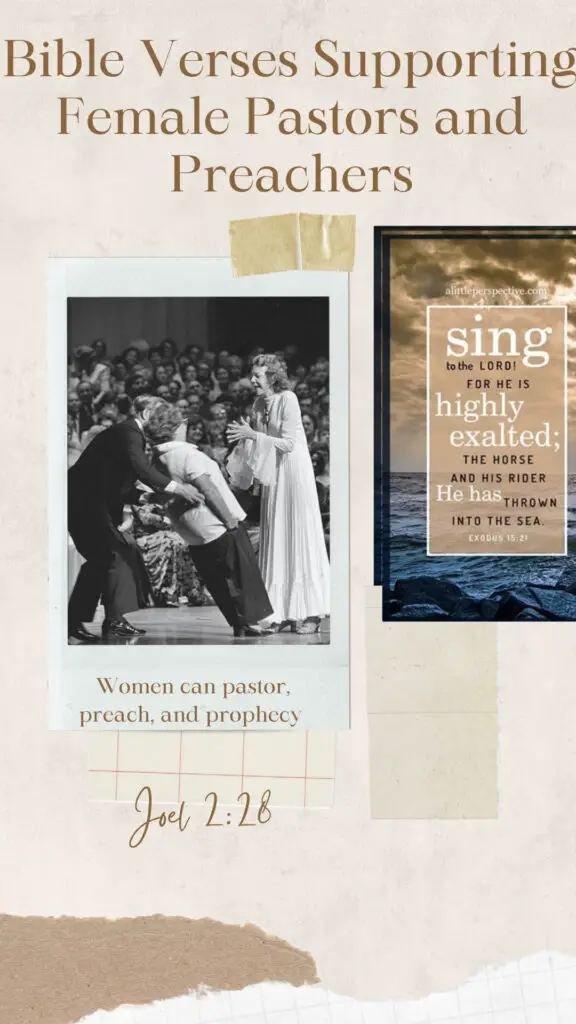
To start us off, here are 11 bible verses with their explanations to support female pastors. Each verse is taken from the King James Version (KJV) of the Bible:
1. Galatians 3:28
“There is neither Jew nor Greek, there is neither bond nor free, there is neither male nor female: for ye are all one in Christ Jesus.”
This verse emphasizes that in Christ, all people are equal and no one group has more value or worth than another, including males and females.
2. Joel 2:28
“And it shall come to pass afterward, that I will pour out my spirit upon all flesh; and your sons and your daughters shall prophesy, your old men shall dream dreams, your young men shall see visions.”
Here in this verse we see that the Holy Spirit will be poured out on all people, including women, who will prophesy and speak God’s truth.
3. Exodus 15:20
“And Miriam the prophetess, the sister of Aaron, took a timbrel in her hand; and all the women went out after her with timbrels and with dances.”
Miriam was a prophetess, and a prophet is someone who hears from God and then declares (preach) God’s words to his people. As highlighted in this verse, Miriam also led women in worship and celebration to God.
4. Acts 2:18
“And on my servants and on my handmaidens I will pour out in those days of my Spirit; and they shall prophesy.”
The writer of Acts is telling us that both male and female servants will prophesy when the Holy Spirit is poured out on them.
5. 1 Corinthians 14:34
“Let your women keep silence in the churches: for it is not permitted unto them to speak; but they are commanded to be under obedience as also saith the law.”
Here is where things gets interesting and this verse has similar cultural and historical context as 1 Timothy 2:12, as Paul was addressing a specific issue in the church in Corinth where women were disrupting services.
However, this verse should not be interpreted as a blanket statement against women speaking or leading in all circumstances.
👉 Must Read 👉 Who was the first Woman preacher in the Bible: Kjv Scriptures
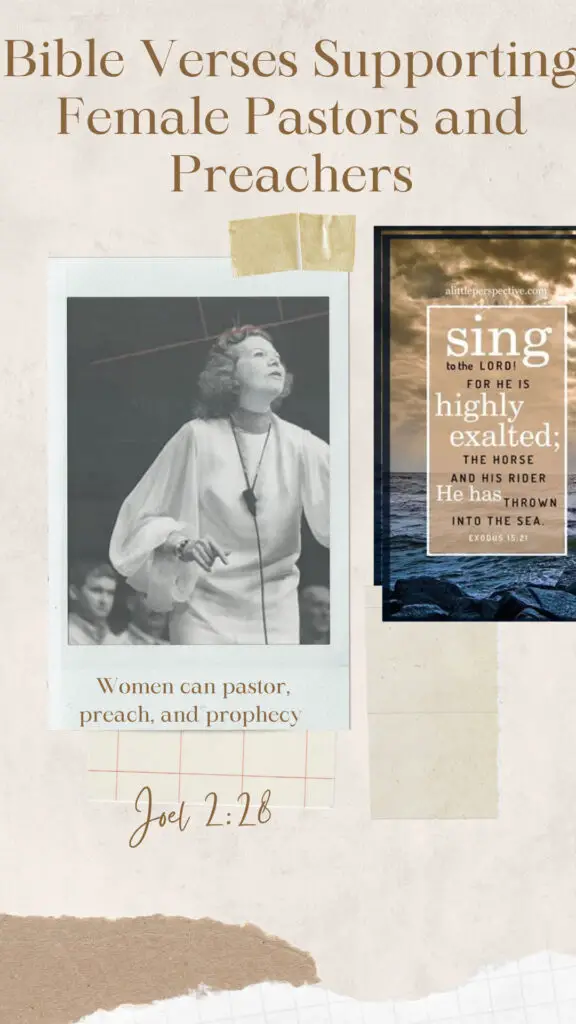
6. Romans 16:12
“Salute Tryphena and Tryphosa, who labour in the Lord. Salute the beloved Persis, which laboured much in the Lord.”
This passage highlights women who were laboring in the Lord and serving in ministry alongside Paul.
7. Romans 16:1
“I commend unto you Phebe our sister, which is a servant of the church which is at Cenchrea.”
Here in this verse we see Phebe, a woman who served as a servant in the church is commended for her work in the ministry.
8. Acts 21:9
“And the same man had four daughters, virgins, which did prophesy.”
This verse highlights four daughters of Philip who prophesied, indicating that women had a role in prophesying and speaking God’s truth.
9. Judges 4:4
“And Deborah, a prophetess, the wife of Lapidoth, she judged Israel at that time.”
In this verse, we seebDeborah, a prophetess who judged Israel and played a significant leadership role in the Old Testament.
10. 1 Kings 5:12
“And the Lord gave wisdom unto Solomon, as he promised him: and there was peace between Hiram and Solomon; and they two made a league together.”
This passage does not explicitly speak about women, but it highlights Solomon’s wisdom and the fact that God can give wisdom to anyone, including women.
👉 You May Like 👉 Healing Scriptures for Women (10 Powerful Bible Verses)
Old Testament Support Female Pastors and Preachers
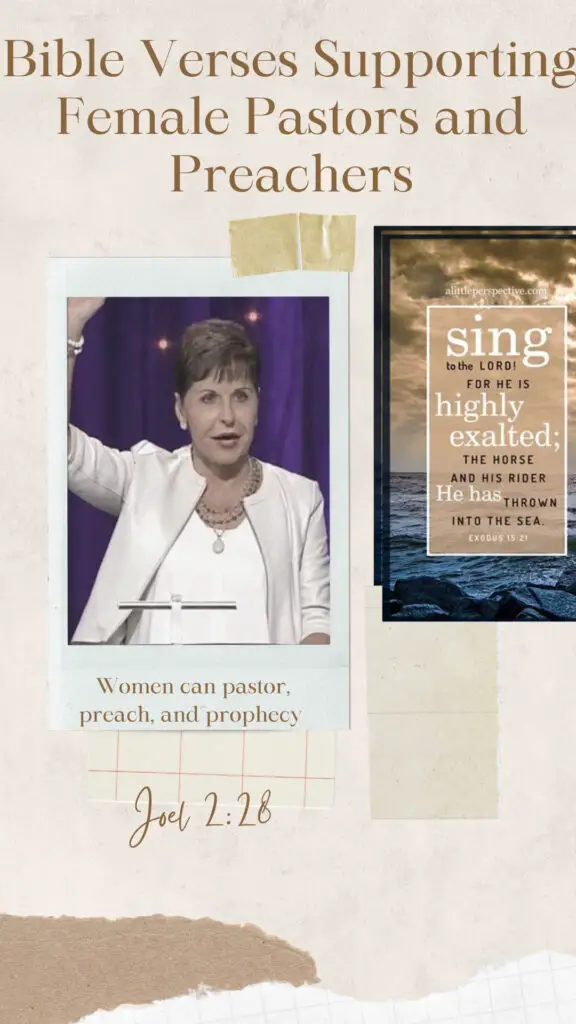
Let’s explore the Old Testament, where we find three prominent examples of women in leadership roles.
A. Miriam’s leadership role in Exodus
First, let’s look at Miriam’s leadership role in Exodus. Miriam was Moses’ sister, and she played a crucial role in the Israelites’ exodus from Egypt.
In Exodus 15:20-21, we read that Miriam led the women in a song of praise to God after He had saved them from the pursuing Egyptian army.
Her leadership and influence are further highlighted in Numbers 12, where she and Aaron challenge Moses’ leadership.
While this results in God rebuking them, it shows that Miriam was a respected and influential figure in the community.
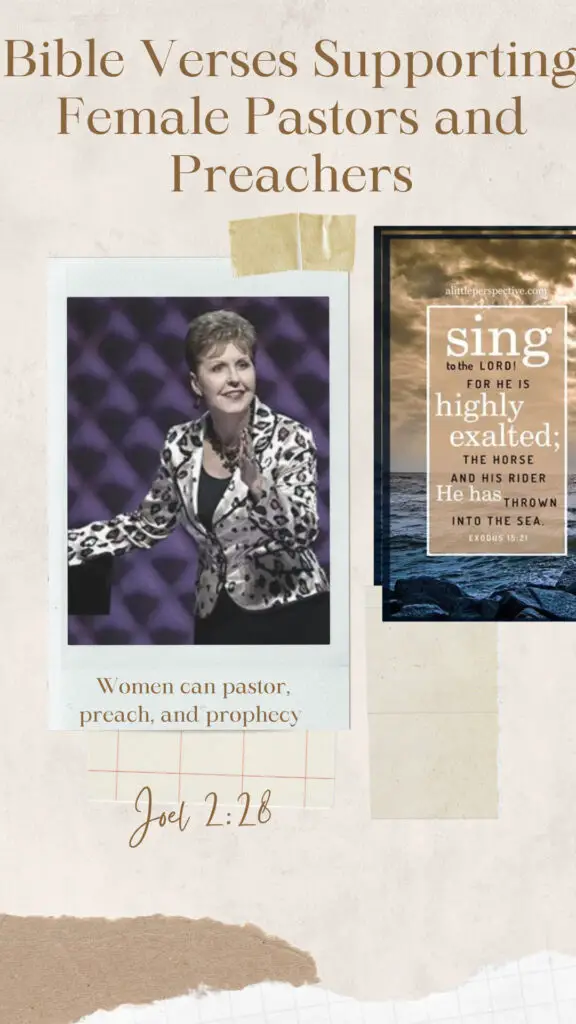
B. Deborah’s role as a judge in Judges
Next, we have Deborah’s role as a judge in Judges. In Judges 4-5, we read about Deborah’s leadership as a prophetess and judge.
She not only prophesied and gave instructions to Barak, but she also accompanied him into battle against the Canaanite army.
Through her leadership, the Israelites were victorious, and the land had peace for forty years.
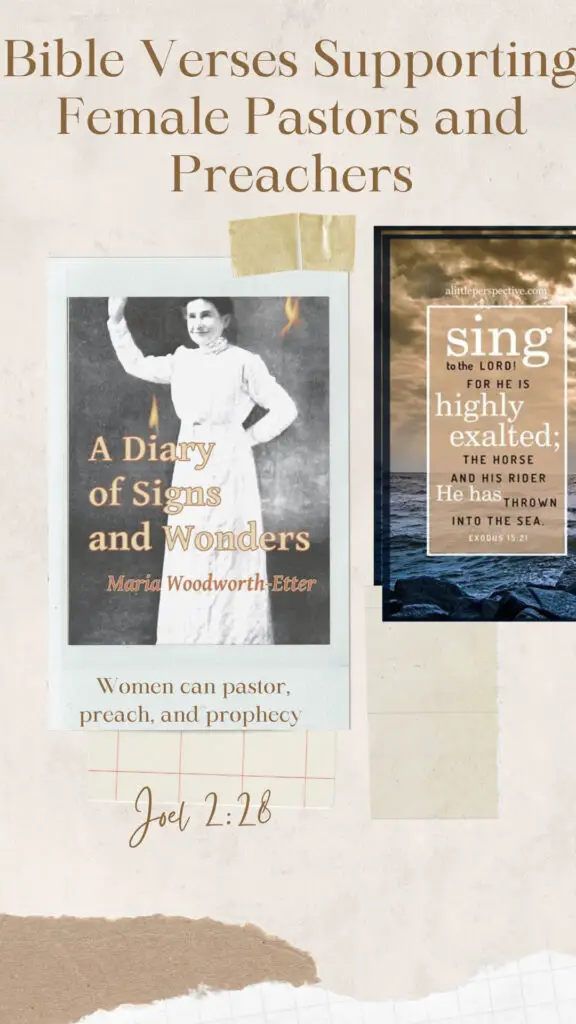
C. Huldah’s prophetic ministry in 2 Kings and 2 Chronicles
Lastly, we have Huldah’s prophetic ministry in 2 Kings and 2 Chronicles. When King Josiah found the Book of the Law, he sent it to Huldah to confirm its authenticity.
Huldah not only affirmed that it was God’s word but also prophesied about the judgment that was to come because of Israel’s disobedience.
These three examples illustrate that women played important and influential roles in Israel’s history.
Their leadership and prophetic ministries were recognized and respected by both men and women. They show that God can use anyone, regardless of gender, to fulfill His purposes.
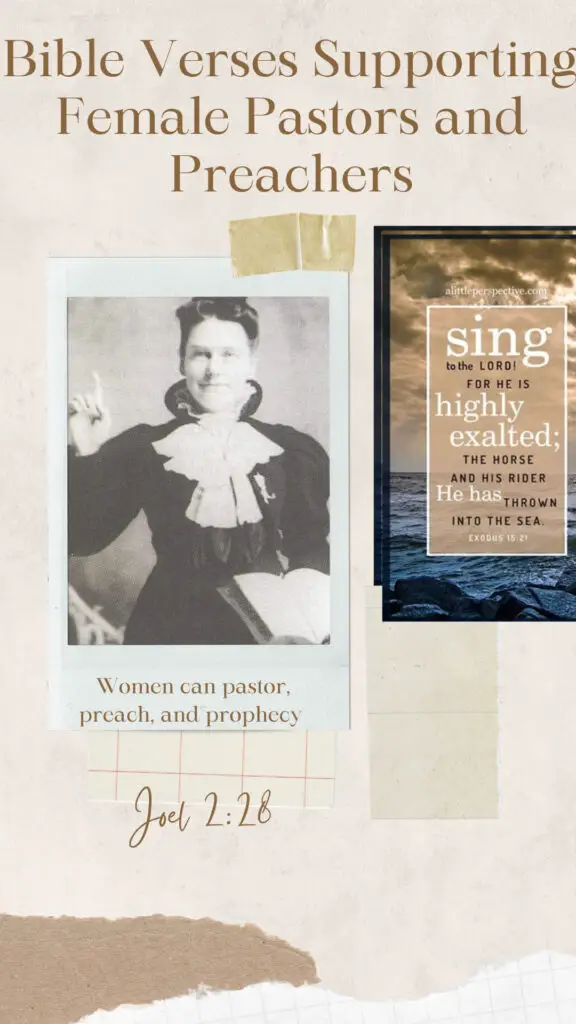
New Testament Support Female Pastors and Preachers
Are you curious about the biblical evidence supporting female pastors? In this article, we’ll dive into the New Testament support for women in leadership positions within the church.
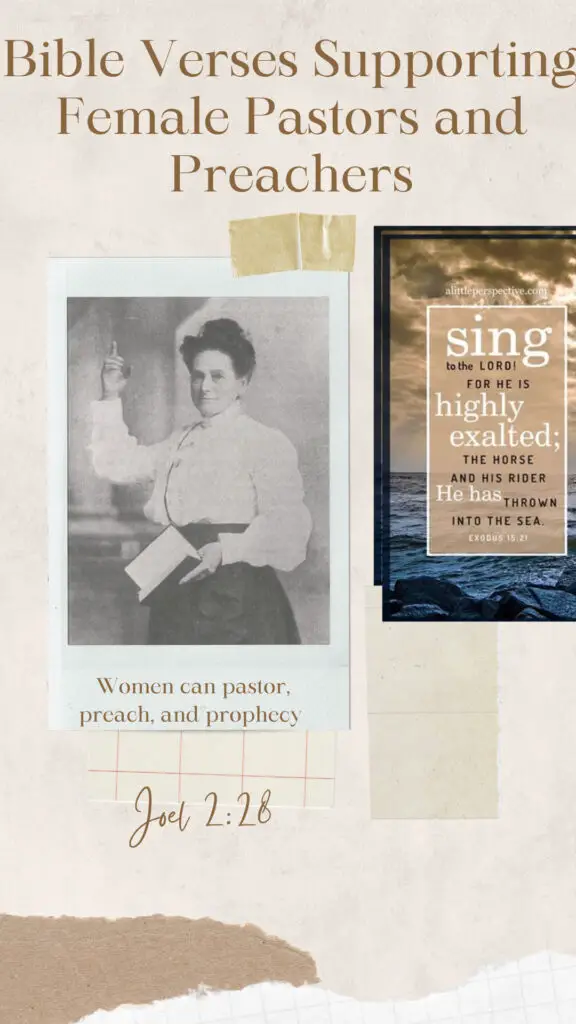
A. Jesus’ interactions with women and their significance
Jesus’ interactions with women in the New Testament were often groundbreaking for their time.
He spoke to women who were shunned by society, such as the Samaritan woman at the well in John 4.
He also allowed women to sit and learn from him as disciples, as demonstrated by Mary sitting at his feet in Luke 10.
These interactions showed that Jesus valued women and their contributions, which can be interpreted as a biblical endorsement of women in leadership roles within the church.
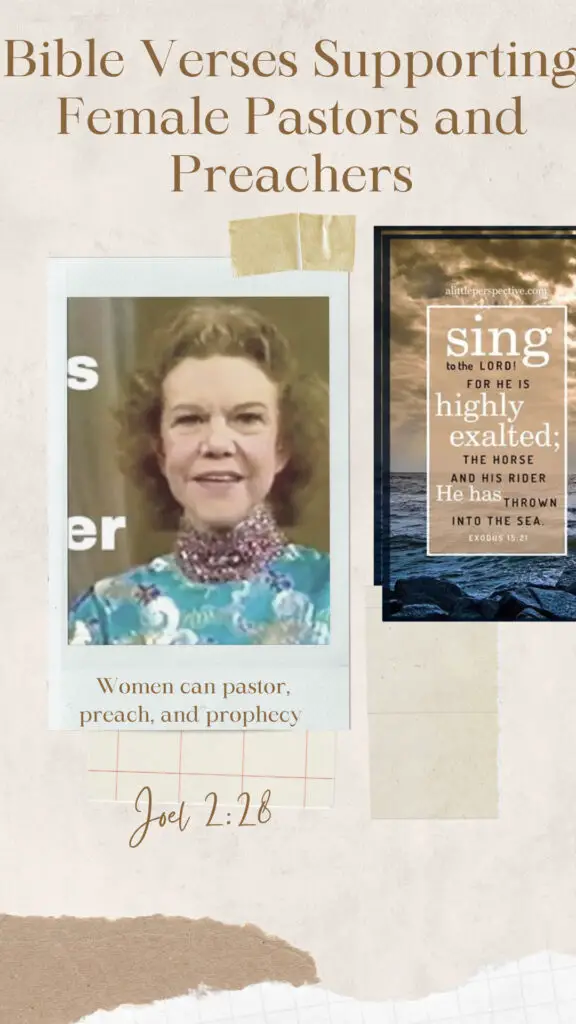
B. Women’s role in the early church and Paul’s recognition of their contributions
Women played an important role in the early church, as evidenced by the many female leaders and workers mentioned in the New Testament.
Priscilla, for example, was a teacher and coworker of Paul’s (Acts 18:24-26), and Mary was described as “working very hard” among the believers (Romans 16:6).
Paul himself recognized and commended the contributions of women in his letters, such as in his greeting to “Junia, outstanding among the apostles” in Romans 16:7.
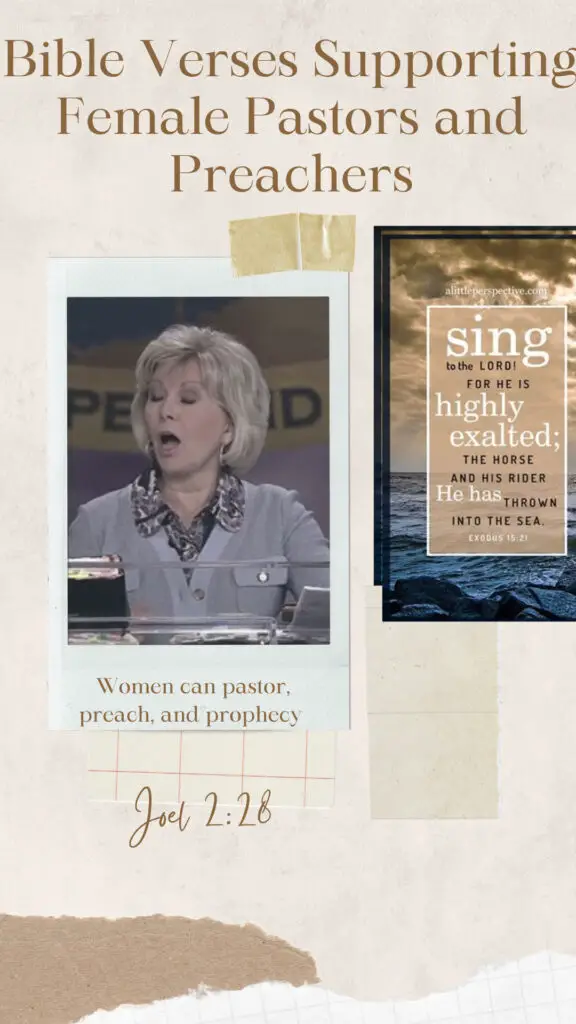
C. Phoebe’s designation as a deaconess in Romans
In Romans 16:1-2, Paul introduces Phoebe as a “servant” or “deaconess” in the church at Cenchreae.
While some translations use the term “helper” instead of “deaconess,” the Greek word used, diakonon, is the same word used to describe male deacons in the New Testament.
This suggests that Phoebe held a position of leadership within the early church and was recognized as such by Paul.
What more can I say, there is ample New Testament support for the idea of female pastors and leaders within the church.
Jesus’ interactions with women, the important role of women in the early church, and Paul’s recognition of their contributions all point to a biblical endorsement of women in leadership roles.
Churches should re-examine their traditional stance on women in leadership and consider these biblical examples.
Objections and Counterarguments on Female Pastors and Preachers
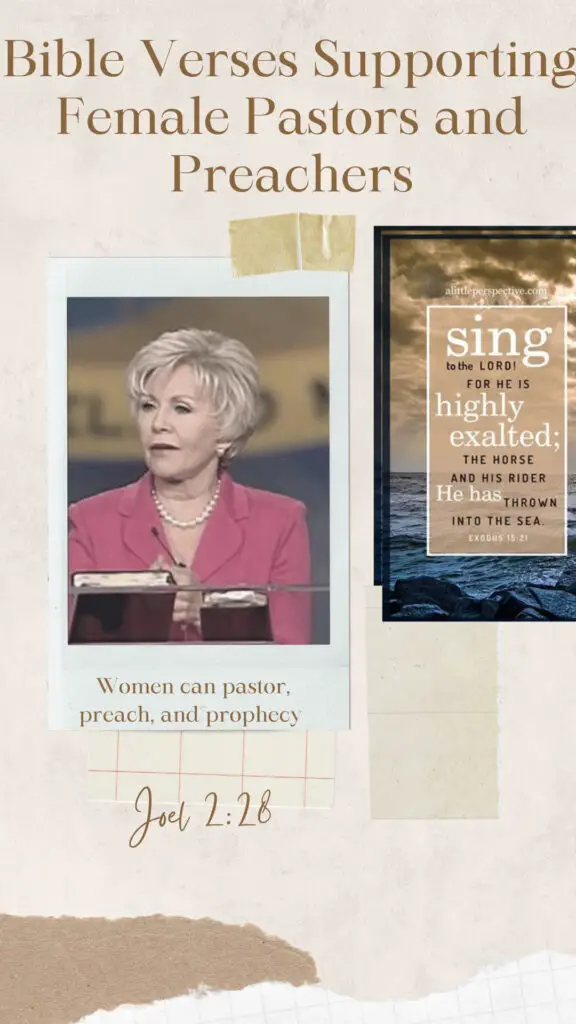
As with any debate, there are always opposing viewpoints. In this case, some argue that the Bible supports the idea that only men should be pastors.
But when we examine the key biblical passages used to argue against female pastors, we can see that these arguments do not hold up under scrutiny.
Examination of Key Biblical Passages
Let’s take a closer look at some of the passages often cited as evidence against female pastors.
“But Paul said women should be silent in church” This statement is often taken out of context.
When we look at the surrounding verses in 1 Corinthians 14:33-35, we see that Paul is addressing disorderly conduct in the church, not limiting the role of women in ministry.
In fact, earlier in the same book, Paul acknowledges the contributions of women in ministry (1 Corinthians 11:5).
“But the Bible says men are the head of the household” While it’s true that the Bible teaches that men are the head of the household (Ephesians 5:23), this does not mean that women cannot lead in other areas of life, including ministry.
What some people fail to see is that the same passage goes on to say that husbands should love their wives as Christ loved the church, sacrificing himself for her. This implies a mutual respect and partnership between men and women, not a hierarchy of power.
“But the Bible teaches that only men can be leaders”
While there are certainly many examples of male leaders in the Bible, this does not mean that women are excluded from leadership roles.
There are numerous examples of women leaders in both the Old and New Testaments, including Deborah (Judges 4-5), Huldah (2 Kings 22:14-20), and Phoebe (Romans 16:1-2).
Responses to Common Objections
Now that we have examined some of the key biblical passages used to argue against female pastors, let’s take a look at some common objections and responses to them.
“But women are not mentioned as pastors in the Bible”
While the term “pastor” may not have been used in the Bible to describe women, this does not mean that women were excluded from leadership roles in the early church.
The New Testament mentions several women who were active in ministry and leadership, such as Phoebe (Romans 16:1-2) and Priscilla (Romans 16:3).
“But women cannot fulfill the biblical requirements for pastors”
This objection is based on a narrow interpretation of the biblical requirements for pastors found in 1 Timothy 3:1-7 and Titus 1:5-9.
However, many of these requirements, such as being “above reproach” and “able to teach,” can be fulfilled by both men and women. Additionally, these lists are not meant to be exhaustive or exclusive.
“But women are more emotional and irrational than men, and therefore not fit for pastoral leadership”
This objection is based on sexist and outdated stereotypes, and is not supported by scripture.
The Bible teaches that both men and women are created in God’s image (Genesis 1:27), and that God’s gifts and callings are not limited by gender (Galatians 3:28).
Frequently Asked Questions about Bible Verses Supporting Female Pastors and Preachers
Q: Are there any Bible verses that support the idea of female pastors and preachers?
A: Yes, there are several Bible verses that can be interpreted as supporting the role of women in pastoral leadership.
Q: What is the biblical basis for supporting female pastors and preachers?
A: The biblical basis for supporting female pastors and preachers stems from various passages that highlight the equality of men and women in Christ and the inclusion of women in ministry.
Q: Can you provide specific examples of Bible verses that support female pastors and preachers?
A: Certainly! Here are a few examples:
Galatians 3:28: “There is neither Jew nor Greek, slave nor free, male nor female, for you are all one in Christ Jesus.”
Acts 2:17-18: “In the last days, God says, I will pour out my Spirit on all people. Your sons and daughters will prophesy, your young men will see visions, your old men will dream dreams. Even on my servants, both men and women, I will pour out my Spirit in those days, and they will prophesy.”
Romans 16:1-2: “I commend to you our sister Phoebe, a deacon of the church in Cenchreae. I ask you to receive her in the Lord in a way worthy of his people and to give her any help she may need from you, for she has been the benefactor of many people, including me.”
Q: How should these verses be understood in the context of supporting female pastors and preachers?
A: These verses emphasize the equality of men and women in Christ and suggest that women have a role to play in proclaiming the Gospel and serving in leadership positions within the church.
Q: Are there any other biblical examples of women in leadership roles within the early church?
A: Yes, there are several examples. For instance:
Priscilla, along with her husband Aquila, taught the prominent preacher Apollos in Acts 18:26.
Junia is mentioned as being “outstanding among the apostles” in Romans 16:7.
Phoebe is referred to as a deacon in Romans 16:1.
Q: Are there any Bible verses that suggest only men can hold leadership positions in the church?
A: While some argue that certain verses may imply male leadership, the interpretation of these passages can vary, and they should be considered alongside the broader biblical narrative of equality and inclusion.
Q: How can we approach the topic of female pastors and preachers respectfully within different denominations?
A: It is crucial to engage in open and respectful dialogue, studying the Bible together, and seeking a deeper understanding of each other’s perspectives. Each denomination may have its own theological stance, and conversations should be approached with empathy and a willingness to listen.
Q: Can women serve in leadership roles other than being pastors or preachers?
A: Absolutely! Many women serve in various leadership positions within the church, such as elders, deacons, worship leaders, teachers, and ministry directors.
Q: What are some practical steps churches can take to support and encourage female pastors and preachers?
A: Churches can actively promote gender equality and inclusivity by providing mentoring programs, leadership development opportunities, and creating an environment that values the gifts and talents of all individuals, regardless of gender.
Q: Is supporting female pastors and preachers a recent development in Christian theology?
A: While it may have gained more attention and acceptance in recent years, the idea of female pastors and preachers can be traced back to the early church, where women played significant roles in spreading the Gospel.
Remember, these answers are not exhaustive, and the interpretation of specific Bible verses may vary among individuals and denominations. It’s important to approach this topic with an open mind and a desire to seek a deeper understanding of Scripture.
Final Thoughts
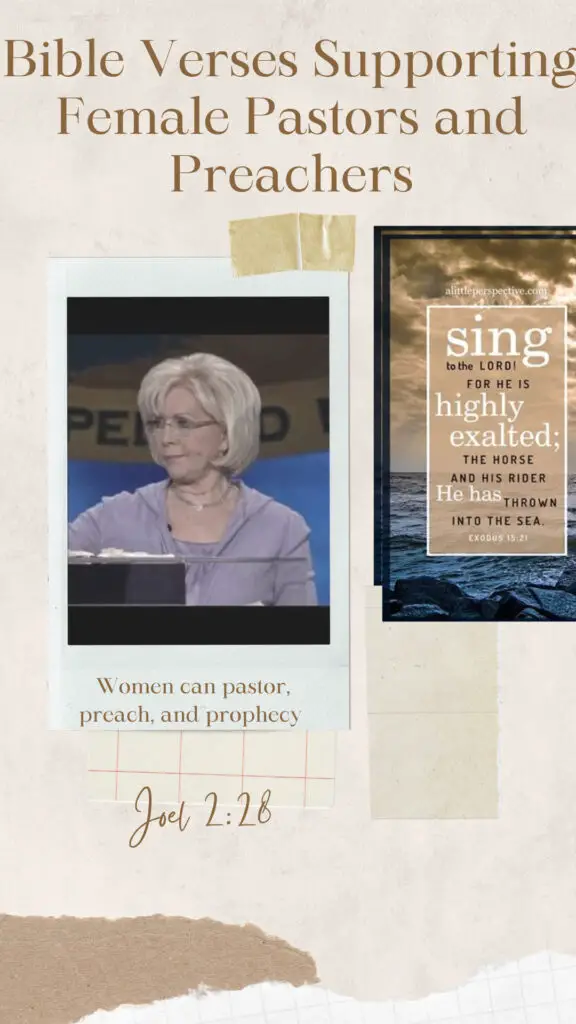
After examining various biblical passages, it is clear that there is ample evidence supporting the idea of female pastors.
In the Old Testament, we see the examples of Miriam, Deborah, and Huldah who all played significant roles as leaders, judges, and prophets.
In the New Testament, Jesus had a high regard for women, and we see women playing important roles in the early church.
Furthermore, Phoebe was specifically designated as a deaconess in Romans.
Despite this evidence, some churches still hold onto outdated beliefs that limit the role of women in leadership positions.
However, we urge churches to reexamine their position and to embrace the idea of female pastors.
By doing so, churches can tap into the unique skills, experiences, and perspectives that women bring to the table, ultimately strengthening and enriching their congregations.
It’s time for churches to recognize that gender should not be a barrier to fulfilling God’s calling.
We hope that this article has shed some light on this important topic and that it has inspired you to take action.
Let’s work together to create a more inclusive and equitable future for all believers.
If you’d like to read more on this subject, we recommend the following resources:
- Christians for Biblical Equality – https://www.cbeinternational.org/
- Junia Project – https://juniaproject.com/
- Women in Ministry – https://www.womeninministry.org/
Remember, God has called us all to serve him, regardless of gender.
Let’s embrace this truth and work towards a more just and inclusive future for all.

Faithway.info, your online sanctuary for deepening your spiritual journey and mastering the teachings of the Bible. At Faithway.info, we are passionate about making the wisdom of the Bible accessible to everyone, fostering a community dedicated to growth, understanding, and support.
